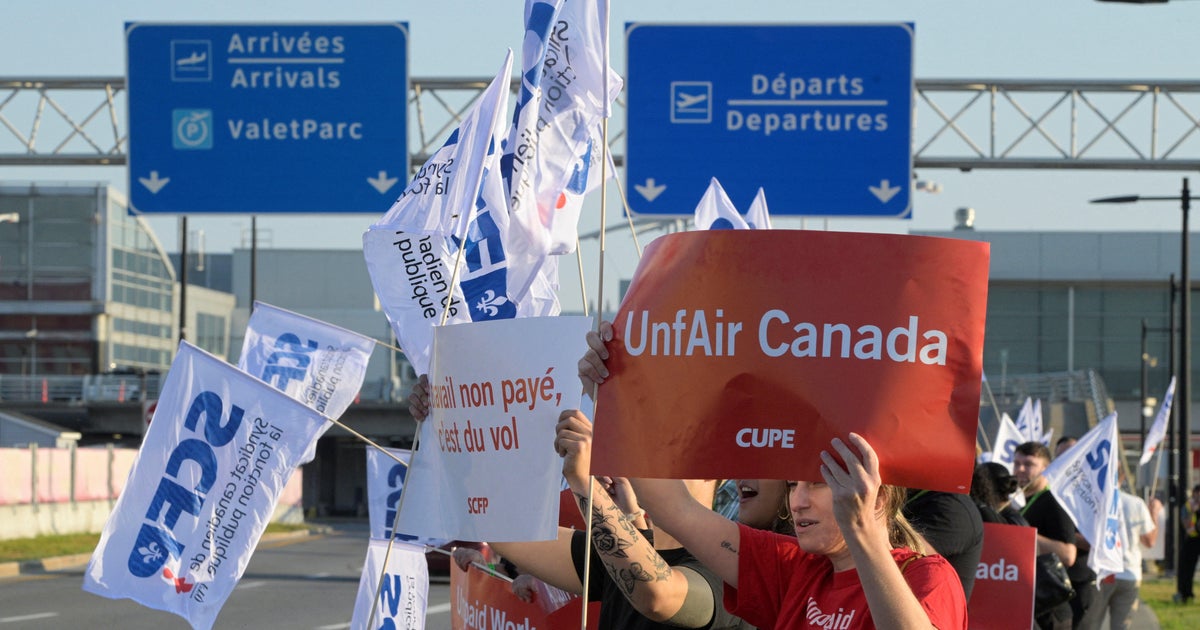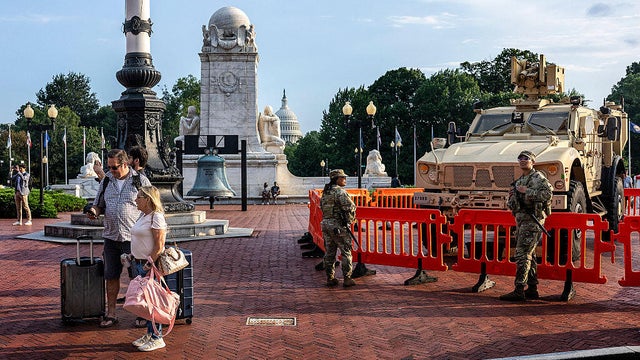

No response returned

and its striking flight attendants were forced back to work and into arbitration Saturday by Canada's government after an early morning strike stranded more than 100,000 travelers around the world during the peak summer travel season.
Federal Jobs Minister Patty Hajdu said now is not the time to take risks with the economy while announcing the intervention. It means the 10,000 flight attendants will return to work soon.
"The talks broke down. It is clear that the parties are not any closer to resolving some of the key issues that remain and they will need help with the arbitrator," Hajdu said.
Hajdu said the full resumption of services could take days, noting it is up to the Canada Industrial Relations Board.
Earlier Saturday, the airline suspended all operations as more than 10,000 of the airline's flight attendants went on strike after a deadline to reach a deal passed. Air Canada operates around 700 flights per day.
"We are now officially on strike! Picket lines will be active at all bases," the Canadian Union of Public Employees said in a statement.
It is the first strike by flight attendants since 1985.
"The Liberals have talked out of both sides of their mouths. They said the best place for this is at the bargaining table. They refused to correct this historic injustice through legislation," said Wesley Lesosky, President of the Air Canada Component of the Canadian Union of Public Employees.
"Now, when we're at the bargaining table with an obstinate employer, the Liberals are violating our Charter rights to take job action and give Air Canada exactly what they want — hours and hours of unpaid labour from underpaid flight attendants, while the company pulls in sky-high profits and extraordinary executive compensation," Lesosky said in a statement.
A bitter contract fight between Canada's largest airline and the union representing 10,000 of its flight attendants escalated Friday as the union turned down the airline's request to enter into government-directed arbitration, which would eliminate its right to strike and allow a third-party mediator to decide the terms of a new contract.
Flight attendants walked off the job around 1 a.m. EDT on Saturday. Around the same time, Air Canada said it would begin locking flight attendants out of airports.
Hugh Pouliot, the spokesman for the union, earlier said the union had a meeting with Hajdu and representatives from Air Canada earlier Friday evening.
"CUPE has engaged with the mediator to relay our willingness to continue bargaining — despite the fact that Air Canada has not countered our last two offers since Tuesday," he said in an email. "We're here to bargain a deal, not to go on strike."
A complete shutdown will affect approximately 130,000 people daily, and around 25,000 Canadians will be stranded abroad each day. Air Canada operates around 700 flights per day.
Keelin Pringnitz, from Ottawa, was returning with her family from a European vacation when they became stranded at London's Heathrow Airport after flights were cancelled. She said there was an option for the travelers in line to go the United States, but was told there wouldn't be any further assistance once they landed in the U.S.
"It didn't go over well with the line. Nobody really seemed interested, everybody seemed a little bit amused almost at the suggestion, or exasperated, because it is a bit ridiculous to offer to take stranded passengers to a different country to strand them there," she said.
Montreal resident Alex Laroche, 21, and his girlfriend had been saving for their European vacation since Christmas. Now their $8,000 trip with nonrefundable lodging is on the line as they wait to hear from Air Canada about the fate of their Saturday night flight to Nice, France.
Laroche said he considered booking new flights with a different carrier, but he said most of them are nearly full and cost more than double the $3,000 they paid for their original tickets.
"At this point, it's just a waiting game," he said.
Laroche said he was initially upset over the union's decision to go on strike, but that he had a change of heart after reading about the key issues at the center of the contract negotiations, including the issue of wages.
"Their wage is barely livable," Laroche said.
The airline said it would also offer alternative travel options through other Canadian and foreign airlines when possible. But it warned that it could not guarantee immediate rebooking because flights on other airlines are already full "due to the summer travel peak."
"Air Canada is strongly advising affected customers not to go to the airport unless they have a confirmed ticket on an airline other than Air Canada or Air Canada Rouge," the airline said in a statement. "Air Canada deeply regrets the effect the strike is having on customers."
Canada is the second-largest country in the world and flying is often the only viable way to travel around the nation. The government forced the country's two major railroads into arbitration with their labor union last year during a work stoppage. The union for the rail workers is suing, arguing the government is removing a union's leverage in negotiations.
The Business Council of Canada has urged the government to impose binding arbitration in this case, too.
In anticipation of the strike, the airline began as flight attendants did not report to work.
How long the airline's planes will be grounded remains to be seen, but Air Canada Chief Operating Officer Mark Nasr has said it could take up to a week to restart operations once a tentative deal is reached fully.
Passengers whose travel is impacted will be eligible to request a full refund on the airline's website or mobile app, according to Air Canada.
Air Canada and the Canadian Union of Public Employees have been in contract talks for about eight months, but they have yet to reach a tentative deal.
Both sides say they remain far apart on the issue of pay and the unpaid work flight attendants do when planes aren't in the air.
The airline's latest offer included a 38% increase in total compensation, including benefits and pensions over four years, that it said "would have made our flight attendants the best compensated in Canada."
But the union pushed back, saying the proposed 8% raise in the first year didn't go far enough because of inflation.





